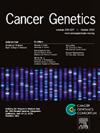The effect of HOTAIR gene variants on the development of bladder cancer and its clinicopathological characteristics in a Caucasian population
IF 2.1
4区 医学
Q4 GENETICS & HEREDITY
引用次数: 0
Abstract
Background
The age-adjusted rate of Bladder cancer (BC) in Türkiye is quite high, and genetic factors are effective in BC. Long non-coding RNAs (lncRNAs) synthesized from the HOTAIR gene have been shown to promote tumor progression in many cancers. rs874945 and rs4759314 polymorphisms in the HOTAIR gene cause changes in the expression levels of lncRNAs synthesized from this gene. The aim of this study was to explore for the first time the association of these variants with BC in a Caucasian population.
Methods
The present study explored the HOTAIR gene polymorphisms in 98 BC patients and in 150 healthy individuals using real-time polymerase chain reaction (RT-PCR).
Results
Carrying rs874945 G allele and GA genotype increased the BC risk in the statistic models. However, even if rs4759314 variant increased of BC risk was not significant. Similarly, although both polymorphisms increased clinicopathological features associated with poor prognosis, they were not statistically significant. Moreover, being older than 60 years and smoking are independent risk factors for BC.
Discussion
The current study is the first to show that patients carrying the G allele of the rs874945 polymorphism have a higher risk of BC in the Caucasian population. This work suggests that rs4759314 polymorphism should be studied in the Caucasian population with a larger sample size of BC patients.
HOTAIR基因变异对白种人膀胱癌发展及其临床病理特征的影响
背景:基耶人膀胱癌(BC)的年龄调整率相当高,遗传因素在BC中起作用。由HOTAIR基因合成的长链非编码rna (lncRNAs)已被证明在许多癌症中促进肿瘤进展。HOTAIR基因的rs874945和rs4759314多态性导致由该基因合成的lncrna表达水平发生变化。本研究的目的是首次探索这些变异与高加索人群中BC的关系。方法采用实时聚合酶链反应(RT-PCR)对98例BC患者和150例健康人群的HOTAIR基因多态性进行分析。结果在统计模型中,携带rs874945 G等位基因和GA基因型增加了BC的风险。然而,即使rs4759314变异增加BC风险也不显著。同样,尽管这两种多态性增加了与预后不良相关的临床病理特征,但它们没有统计学意义。此外,年龄超过60岁和吸烟是BC的独立危险因素。目前的研究首次表明,携带rs874945多态性的G等位基因的患者在高加索人群中患BC的风险更高。这项工作表明,rs4759314多态性应该在样本量较大的BC患者的高加索人群中进行研究。
本文章由计算机程序翻译,如有差异,请以英文原文为准。
求助全文
约1分钟内获得全文
求助全文
来源期刊

Cancer Genetics
ONCOLOGY-GENETICS & HEREDITY
CiteScore
3.20
自引率
5.30%
发文量
167
审稿时长
27 days
期刊介绍:
The aim of Cancer Genetics is to publish high quality scientific papers on the cellular, genetic and molecular aspects of cancer, including cancer predisposition and clinical diagnostic applications. Specific areas of interest include descriptions of new chromosomal, molecular or epigenetic alterations in benign and malignant diseases; novel laboratory approaches for identification and characterization of chromosomal rearrangements or genomic alterations in cancer cells; correlation of genetic changes with pathology and clinical presentation; and the molecular genetics of cancer predisposition. To reach a basic science and clinical multidisciplinary audience, we welcome original full-length articles, reviews, meeting summaries, brief reports, and letters to the editor.
 求助内容:
求助内容: 应助结果提醒方式:
应助结果提醒方式:


